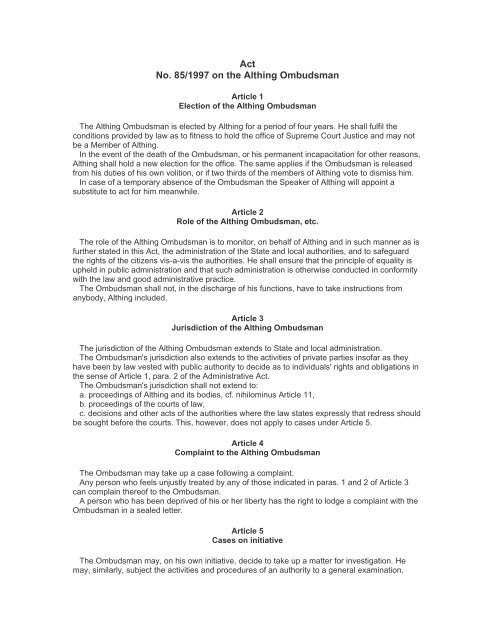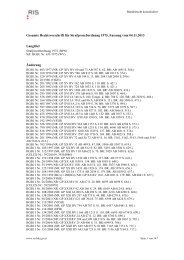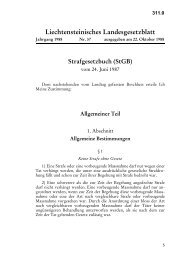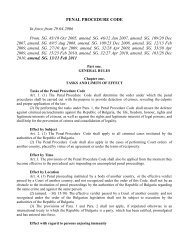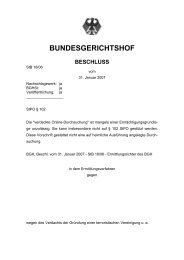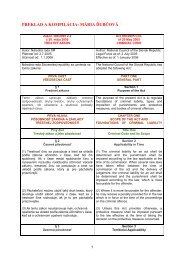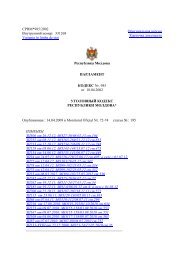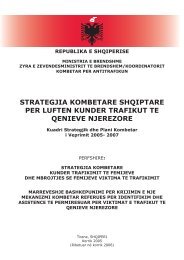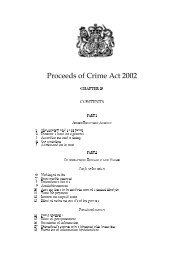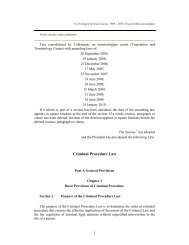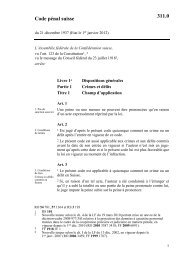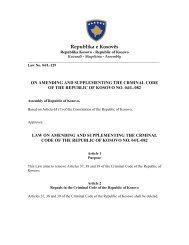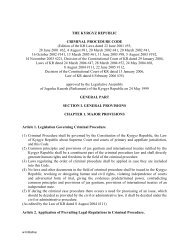Act No. 85/1997 on the Althing Ombudsman - Legislationline
Act No. 85/1997 on the Althing Ombudsman - Legislationline
Act No. 85/1997 on the Althing Ombudsman - Legislationline
You also want an ePaper? Increase the reach of your titles
YUMPU automatically turns print PDFs into web optimized ePapers that Google loves.
<str<strong>on</strong>g>Act</str<strong>on</strong>g><br />
<str<strong>on</strong>g>No</str<strong>on</strong>g>. <str<strong>on</strong>g>85</str<strong>on</strong>g>/<str<strong>on</strong>g>1997</str<strong>on</strong>g> <strong>on</strong> <strong>the</strong> <strong>Althing</strong> <strong>Ombudsman</strong><br />
Article 1<br />
Electi<strong>on</strong> of <strong>the</strong> <strong>Althing</strong> <strong>Ombudsman</strong><br />
The <strong>Althing</strong> <strong>Ombudsman</strong> is elected by <strong>Althing</strong> for a period of four years. He shall fulfil <strong>the</strong><br />
c<strong>on</strong>diti<strong>on</strong>s provided by law as to fitness to hold <strong>the</strong> office of Supreme Court Justice and may not<br />
be a Member of <strong>Althing</strong>.<br />
In <strong>the</strong> event of <strong>the</strong> death of <strong>the</strong> <strong>Ombudsman</strong>, or his permanent incapacitati<strong>on</strong> for o<strong>the</strong>r reas<strong>on</strong>s,<br />
<strong>Althing</strong> shall hold a new electi<strong>on</strong> for <strong>the</strong> office. The same applies if <strong>the</strong> <strong>Ombudsman</strong> is released<br />
from his duties of his own voliti<strong>on</strong>, or if two thirds of <strong>the</strong> members of <strong>Althing</strong> vote to dismiss him.<br />
In case of a temporary absence of <strong>the</strong> <strong>Ombudsman</strong> <strong>the</strong> Speaker of <strong>Althing</strong> will appoint a<br />
substitute to act for him meanwhile.<br />
Article 2<br />
Role of <strong>the</strong> <strong>Althing</strong> <strong>Ombudsman</strong>, etc.<br />
The role of <strong>the</strong> <strong>Althing</strong> <strong>Ombudsman</strong> is to m<strong>on</strong>itor, <strong>on</strong> behalf of <strong>Althing</strong> and in such manner as is<br />
fur<strong>the</strong>r stated in this <str<strong>on</strong>g>Act</str<strong>on</strong>g>, <strong>the</strong> administrati<strong>on</strong> of <strong>the</strong> State and local authorities, and to safeguard<br />
<strong>the</strong> rights of <strong>the</strong> citizens vis-a-vis <strong>the</strong> authorities. He shall ensure that <strong>the</strong> principle of equality is<br />
upheld in public administrati<strong>on</strong> and that such administrati<strong>on</strong> is o<strong>the</strong>rwise c<strong>on</strong>ducted in c<strong>on</strong>formity<br />
with <strong>the</strong> law and good administrative practice.<br />
The <strong>Ombudsman</strong> shall not, in <strong>the</strong> discharge of his functi<strong>on</strong>s, have to take instructi<strong>on</strong>s from<br />
anybody, <strong>Althing</strong> included.<br />
Article 3<br />
Jurisdicti<strong>on</strong> of <strong>the</strong> <strong>Althing</strong> <strong>Ombudsman</strong><br />
The jurisdicti<strong>on</strong> of <strong>the</strong> <strong>Althing</strong> <strong>Ombudsman</strong> extends to State and local administrati<strong>on</strong>.<br />
The <strong>Ombudsman</strong>'s jurisdicti<strong>on</strong> also extends to <strong>the</strong> activities of private parties insofar as <strong>the</strong>y<br />
have been by law vested with public authority to decide as to individuals' rights and obligati<strong>on</strong>s in<br />
<strong>the</strong> sense of Article 1, para. 2 of <strong>the</strong> Administrative <str<strong>on</strong>g>Act</str<strong>on</strong>g>.<br />
The <strong>Ombudsman</strong>'s jurisdicti<strong>on</strong> shall not extend to:<br />
a. proceedings of <strong>Althing</strong> and its bodies, cf. nihilominus Article 11,<br />
b. proceedings of <strong>the</strong> courts of law,<br />
c. decisi<strong>on</strong>s and o<strong>the</strong>r acts of <strong>the</strong> authorities where <strong>the</strong> law states expressly that redress should<br />
be sought before <strong>the</strong> courts. This, however, does not apply to cases under Article 5.<br />
Article 4<br />
Complaint to <strong>the</strong> <strong>Althing</strong> <strong>Ombudsman</strong><br />
The <strong>Ombudsman</strong> may take up a case following a complaint.<br />
Any pers<strong>on</strong> who feels unjustly treated by any of those indicated in paras. 1 and 2 of Article 3<br />
can complain <strong>the</strong>reof to <strong>the</strong> <strong>Ombudsman</strong>.<br />
A pers<strong>on</strong> who has been deprived of his or her liberty has <strong>the</strong> right to lodge a complaint with <strong>the</strong><br />
<strong>Ombudsman</strong> in a sealed letter.<br />
Article 5<br />
Cases <strong>on</strong> initiative<br />
The <strong>Ombudsman</strong> may, <strong>on</strong> his own initiative, decide to take up a matter for investigati<strong>on</strong>. He<br />
may, similarly, subject <strong>the</strong> activities and procedures of an authority to a general examinati<strong>on</strong>.
Article 6<br />
C<strong>on</strong>diti<strong>on</strong>s for a complaint being c<strong>on</strong>sidered<br />
A complaint to <strong>the</strong> <strong>Ombudsman</strong> shall be in writing and must state <strong>the</strong> name and address of <strong>the</strong><br />
complainant. It shall describe <strong>the</strong> decisi<strong>on</strong> or o<strong>the</strong>r c<strong>on</strong>duct of <strong>the</strong> authorities giving rise to <strong>the</strong><br />
complaint and be accompanied by all <strong>the</strong> available evidence as to <strong>the</strong> details of <strong>the</strong> case.<br />
A complaint shall be lodged within a year of <strong>the</strong> c<strong>on</strong>clusi<strong>on</strong> of <strong>the</strong> administrative act in questi<strong>on</strong>.<br />
Where a case can be appealed to a higher authority a complaint may <strong>on</strong>ly be lodged with <strong>the</strong><br />
<strong>Ombudsman</strong> after this higher authority has given its ruling. The time limit of <strong>on</strong>e year pursuant to<br />
para. 2 applies from <strong>the</strong> same time.<br />
Article 7<br />
Investigati<strong>on</strong> of a case<br />
The <strong>Ombudsman</strong> may demand from <strong>the</strong> authorities such informati<strong>on</strong> and written explanati<strong>on</strong>s<br />
as he may require for his official purposes, including reports, documents, minutes, and all o<strong>the</strong>r<br />
items with a bearing <strong>on</strong> <strong>the</strong> case.<br />
The <strong>Ombudsman</strong> may summ<strong>on</strong> officials of State and local administrati<strong>on</strong> for hearings <strong>on</strong><br />
matters within <strong>the</strong> <strong>Ombudsman</strong>'s jurisdicti<strong>on</strong>, as well as to give oral informati<strong>on</strong> and explanati<strong>on</strong>s<br />
regarding individual cases.<br />
The <strong>Ombudsman</strong> shall have free access to all premises of <strong>the</strong> authorities in order to carry out<br />
investigati<strong>on</strong>s for his work. In this he shall be given all necessary assistance by <strong>the</strong> officials<br />
c<strong>on</strong>cerned.<br />
The <strong>Ombudsman</strong> cannot demand to have informati<strong>on</strong> which c<strong>on</strong>cerns state security, or <strong>on</strong> such<br />
foreign affairs as are to be kept secret, except with <strong>the</strong> permissi<strong>on</strong> of <strong>the</strong> relevant cabinet<br />
minister.<br />
The <strong>Ombudsman</strong> may cause a pers<strong>on</strong> to be summ<strong>on</strong>ed before a district judge to give evidence<br />
<strong>on</strong> particulars which <strong>the</strong> <strong>Ombudsman</strong> deems to be significant. Such hearings shall be c<strong>on</strong>ducted<br />
pursuant to procedural law <strong>on</strong> criminal cases as applicable. Hearings may, if so decided, be held<br />
in camera. The <strong>Ombudsman</strong> is at liberty to engage <strong>the</strong> help of specialists when called for and to<br />
secure such specialized data as he needs.<br />
Article 8<br />
Duty of silence<br />
The <strong>Ombudsman</strong> shall observe a duty of silence as regards facts which come to his attenti<strong>on</strong> in<br />
<strong>the</strong> course of his work and should, because of legitimate public or private interests, be kept<br />
secret. The same applies to <strong>the</strong> <strong>Ombudsman</strong>'s staff. The duty of silence shall remain even after<br />
terminati<strong>on</strong> of employment.<br />
Article 9<br />
Explanati<strong>on</strong> by <strong>the</strong> Authorities<br />
The <strong>Ombudsman</strong> shall, immediately up<strong>on</strong> deciding to admit a complaint against a public<br />
authority, notify <strong>the</strong> authority c<strong>on</strong>cerned of <strong>the</strong> subject of <strong>the</strong> complaint, unless investigati<strong>on</strong> of <strong>the</strong><br />
matter is likely to be harmed <strong>the</strong>reby.<br />
As a rule, a public authority, against which a complaint has been lodged, shall be given an<br />
opportunity to explain matters to <strong>the</strong> <strong>Ombudsman</strong> before he c<strong>on</strong>cludes <strong>the</strong> case with an Opini<strong>on</strong><br />
pursuant to Article 10, para. 2, subsecti<strong>on</strong> b. He can set a public authority a specific time limit for<br />
this purpose.<br />
Article 10<br />
C<strong>on</strong>clusi<strong>on</strong> of a case
If, right away at <strong>the</strong> outset, <strong>the</strong> <strong>Ombudsman</strong> feels that a complaint does not provide grounds<br />
enough for a closer investigati<strong>on</strong> or that it does not fulfil <strong>the</strong> c<strong>on</strong>diti<strong>on</strong>s of this <str<strong>on</strong>g>Act</str<strong>on</strong>g> as to admissi<strong>on</strong>,<br />
he shall notify <strong>the</strong> complainant accordingly. That is <strong>the</strong> end of <strong>the</strong> matter as far as <strong>the</strong><br />
<strong>Ombudsman</strong> is c<strong>on</strong>cerned.<br />
Once allowed by <strong>the</strong> <strong>Ombudsman</strong> a case may be c<strong>on</strong>cluded by him as follows:<br />
a. He may dismiss it <strong>on</strong> receipt of a clarificati<strong>on</strong> or explanati<strong>on</strong> from a public authority.<br />
b. He may issue an Opini<strong>on</strong> as to whe<strong>the</strong>r an act of a public authority c<strong>on</strong>flicts with <strong>the</strong> law or is<br />
o<strong>the</strong>rwise c<strong>on</strong>trary to good adminstrative practice. Where an act of a public authority becomes<br />
<strong>the</strong> subject of reproach or criticism by <strong>the</strong> <strong>Ombudsman</strong> he may at <strong>the</strong> same time adress to such<br />
authority a recommendati<strong>on</strong> to make amends.<br />
c. Where a complaint involves a legal dispute which should, in principle, be decided by <strong>the</strong><br />
courts of law <strong>the</strong> <strong>Ombudsman</strong> may c<strong>on</strong>clude <strong>the</strong> matter by pointing this out.<br />
d. The <strong>Ombudsman</strong> may recommend to <strong>the</strong> minister of justice that legal aid be accorded where<br />
<strong>the</strong> <strong>Ombudsman</strong> deems appropriate that a case within his scope should be put to <strong>the</strong> courts of<br />
law.<br />
e. Where <strong>the</strong> <strong>Ombudsman</strong> becomes aware of a breach in office, punishable by law, he may<br />
notify <strong>the</strong> appropriate authority <strong>the</strong>reof.<br />
Article 11<br />
Flaws in legislati<strong>on</strong>, etc.<br />
Where <strong>the</strong> <strong>Ombudsman</strong> detects legal flaws in current legislati<strong>on</strong> or public rules he shall notify<br />
<strong>Althing</strong>, <strong>the</strong> relevant cabinet minister, or <strong>the</strong> local authority c<strong>on</strong>cerned.<br />
Article 12<br />
The <strong>Ombudsman</strong>'s Report, etc.<br />
The <strong>Ombudsman</strong> shall report annually to <strong>Althing</strong> <strong>on</strong> his work during <strong>the</strong> preceding calendar<br />
year. The printed report shall be published before 1st September each year.<br />
If <strong>the</strong> <strong>Ombudsman</strong> becomes aware of major errors or transgressi<strong>on</strong>s <strong>on</strong> <strong>the</strong> part of a public<br />
authority, he may submit a special report <strong>on</strong> <strong>the</strong> matter to <strong>Althing</strong> or <strong>the</strong> relevant cabinet minister.<br />
In cases involving local authority officials <strong>the</strong> <strong>Ombudsman</strong> may submit a special report to <strong>the</strong><br />
authority c<strong>on</strong>cerned.<br />
The <strong>Ombudsman</strong> decides, at this own discreti<strong>on</strong>, whe<strong>the</strong>r to issue a communiqué <strong>on</strong> a case<br />
and in what form.<br />
Whenever <strong>the</strong> <strong>Ombudsman</strong> issues a communiqué <strong>on</strong> a case he shall specify what <strong>the</strong> public<br />
authority c<strong>on</strong>cerned has submitted in its defence.<br />
Article 13<br />
Emoluments of <strong>the</strong> <strong>Althing</strong> <strong>Ombudsman</strong>, etc.<br />
The salary of <strong>the</strong> <strong>Ombudsman</strong> is decided by <strong>the</strong> <strong>Althing</strong> Presidium. In o<strong>the</strong>r respects, <strong>the</strong><br />
<strong>Ombudsman</strong> shall enjoy <strong>the</strong> same emoluments as justices of <strong>the</strong> Supreme Court. He shall, at <strong>the</strong><br />
end of his tenure, be entitled to a retaining salary pursuant to Secti<strong>on</strong> VI of <strong>the</strong> <str<strong>on</strong>g>Act</str<strong>on</strong>g> <strong>on</strong> <strong>the</strong> Rights<br />
and Obligati<strong>on</strong>s of Civil Servants.<br />
The <strong>Ombudsman</strong> engages his own staff within <strong>the</strong> limit set by <strong>the</strong> fiscal appropriati<strong>on</strong> in force.<br />
With <strong>the</strong> same proviso, <strong>the</strong> <strong>Ombudsman</strong> is authorized to engage people to work <strong>on</strong> specific tasks.<br />
The provisi<strong>on</strong>s of Article 7 of <strong>the</strong> <str<strong>on</strong>g>Act</str<strong>on</strong>g> <strong>on</strong> <strong>the</strong> Rights and Obligati<strong>on</strong>s of Civil Servants shall not<br />
apply as regards posts in <strong>the</strong> Office of <strong>the</strong> <strong>Ombudsman</strong>.
The Speaker of <strong>Althing</strong> draws up c<strong>on</strong>tracts with <strong>the</strong> staff of <strong>the</strong> <strong>Althing</strong> <strong>Ombudsman</strong>, cf. Article 3<br />
of <strong>the</strong> <str<strong>on</strong>g>Act</str<strong>on</strong>g> <strong>on</strong> Emoluments Agreements for Civil Servants.<br />
Article 14<br />
Eligibility and substitutes<br />
The <strong>Ombudsman</strong> may hold no paid employment <strong>on</strong> behalf of public administrative bodies, nor<br />
in private enterprises, except with <strong>the</strong> c<strong>on</strong>sent of <strong>the</strong> Speaker of <strong>Althing</strong>.<br />
Where <strong>the</strong> <strong>Ombudsman</strong> withdraws from a case <strong>the</strong> Speaker of <strong>Althing</strong> appoints a substitute to<br />
proceed with <strong>the</strong> case. The substitute shall fulfil <strong>the</strong> same c<strong>on</strong>diti<strong>on</strong>s <strong>on</strong> eligibility as <strong>the</strong><br />
<strong>Ombudsman</strong>, with <strong>the</strong> excepti<strong>on</strong> of those stated in para. 1 of this Article.<br />
Article 15<br />
Audit<br />
The accounts of <strong>the</strong> <strong>Ombudsman</strong> shall be audited by an independent chartered auditor<br />
appointed by <strong>the</strong> Speaker of <strong>Althing</strong>.<br />
Article 16<br />
<str<strong>on</strong>g>Act</str<strong>on</strong>g>i<strong>on</strong> against <strong>the</strong> <strong>Ombudsman</strong><br />
Where <strong>the</strong> <strong>Ombudsman</strong> so demands, <strong>the</strong> judge shall dismiss a civil case brought against <strong>the</strong><br />
<strong>Ombudsman</strong> <strong>on</strong> <strong>the</strong> grounds of decisi<strong>on</strong>s taken by him pursuant to Article 10.<br />
Article 17<br />
Rules <strong>on</strong> work and procedures<br />
The <strong>Althing</strong> shall lay down general rules governing <strong>the</strong> activities of <strong>the</strong> <strong>Ombudsman</strong>. These<br />
shall be published in Secti<strong>on</strong> A of <strong>the</strong> Official Journal.<br />
Article 18<br />
Entry into force, etc.<br />
This <str<strong>on</strong>g>Act</str<strong>on</strong>g> enters into force immediately. <str<strong>on</strong>g>Act</str<strong>on</strong>g> <str<strong>on</strong>g>No</str<strong>on</strong>g>. 13 of 20 March 1987 <strong>on</strong> <strong>the</strong> <strong>Althing</strong> <strong>Ombudsman</strong><br />
is <strong>the</strong>reby revoked.


